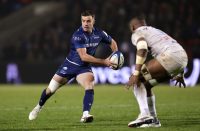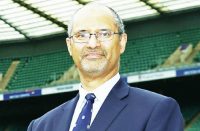 Warren Gatland‘s pre-ordained appointment as the 2013 Lions coach leaves me with one big reservation. It is that he is currently also the coach of Wales, and if Lions’ history teaches us anything it is that trying to marry being an incumbent national coach with being the mastermind of the most famous touring side on earth is like walking a tightrope in a force 10 gale.
Warren Gatland‘s pre-ordained appointment as the 2013 Lions coach leaves me with one big reservation. It is that he is currently also the coach of Wales, and if Lions’ history teaches us anything it is that trying to marry being an incumbent national coach with being the mastermind of the most famous touring side on earth is like walking a tightrope in a force 10 gale.
One of the worst examples of a split in a tour party came on the 1993 tour to New Zealand when the ‘Lion Man’ himself, Ian McGeechan, doubled up as coach of the Lions at the same time as being in charge of Scotland. The tour party was also captained by a talismanic Scot, Gavin Hastings, but when it became apparent to some of the Scottish players that their Test dreams were not going to come to fruition, and they were destined to play for the dirt-trackers, their commitment to the cause began to dwindle.
McGeechan’s refusal to put his close relationship with them before the wider interests of the Lions led to a rift, and there were serious repercussions with senior Test players in the tour party – many of them English – taking the dirt-trackers to task for their lack of commitment in a series of abject midweek performances. The worst of those, ironically, was against a Waikato side which fielded Gatland at hooker.
It is why McGeechan stressed the importance of the all-for-one, one-for-all mentality to the 1997 Lions tour party, and it was that unity of spirit and purpose that was credited as being critical to their 2-1 series victory over South Africa. However, it is remarkable how quickly important lessons can be forgotten, and when Graham Henry was given the Lions coaching job for the 2001 tour to Australia the divisive parochial factor reared up again.
At the time, Henry, like Gatland, was the Kiwi coach of Wales, and having helped to lift them out of the doldrums he had even been styled affectionately as ‘The Great Redeemer’. That did not stop him running into similar problems to McGeechan when a number of the Welsh players, having failed to make the Test side for the series against the Wallabies, returned home less in tune with Henry than they had been on the outward journey to Australia.
Henry’s relationship with many of those players, and with the Wales squad as a whole, never recovered, and he resigned as Wales coach in 2002 with four defeats in six games culminating in a record 54-10 rout by Ireland in the Six Nations.
Last, but not least, there was Clive Woodward and his disastrous ‘Power of Four’ expedition to New Zealand in 2005. Although Woodward had resigned as England coach the previous year he was heavily criticised for weighting his Lions selection far too heavily in favour of his World Cup-winning Red Rose squad, and not keeping an open and impartial outlook on the merits of non-English players.
With the benefit of hindsight it is interesting that Sir Clive took a break from his Olympic duties this week to warn double Grand Slam-winner Gatland of the pitfalls should his appointment as Lions head coach and be confirmed, including the danger that Wales’ prospects of winning the 2015 World Cup could be jeopardised.
“Whoever coaches the Lions, and I think it should be Warren, has to be really careful,” said Woodward.
“Wales have an outstanding team and, I think, they could go all the way in 2015, and you don’t want anything to get in the way of that. He has to manage that process and almost has to get the Welsh team to really want him to do the Lions. They have to understand that stuff is going to happen on a Lions trip that can go wrong and that means your mojo isn’t intact.”
Could Woodward, looking ahead to his post-Olympics future, be canvassing to see whether there is any mileage in having a Lions coaching director who acts as a buffer-zone between a head coach like Gatland and the players? Woodward’s reasoning might be that a man-manager – who gives disappointed players the time, care, attention, and hope, that a Lions coach on a mission to win a Test series does not – could soothe things to the extent that the coach does not burn his other bridges.
Any Woodward involvement with the Lions would be highly controversial following the 2005 debacle, and there are another couple of heavyweight candidates worthy of consideration if a coaching director post was created.
Foremost is McGeechan, whose recent departure from Bath could be a blessing for the 2013 Lions. Not only has he worked in tandem with Gatland already, on the 2009 crusade to South Africa, but his reservoir of knowledge about what it takes to create a winning Lions side is unrivalled. The other candidate is Nick Mallett, with the former South Africa and Italy coach making no secret of his desire to be involved with the Lions.
Mallett is considered to be one of the best analysts in the game, and his knowledge of the current Southern Hemisphere scene, including playing strengths and tactics, is a significant asset.
Whether the Lions consider a director of rugby to be necessary when they have already appointed Andy Irvine as manager for the 2013 tour to Australia is another matter.
In the meantime, Gatland is reported to be in negotiations with the Welsh Rugby Union to take a season’s sabbatical from his role with Wales in order to concentrate on the Lions.
One Comment
Leave a Comment
You must be logged in to post a comment.























Pingback: Webb Schools Free Palestine